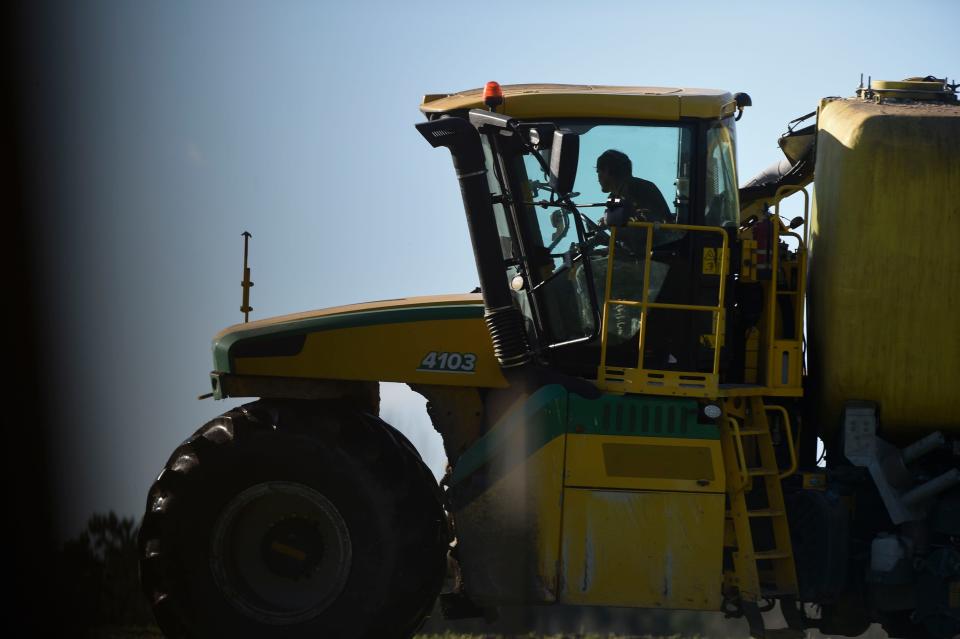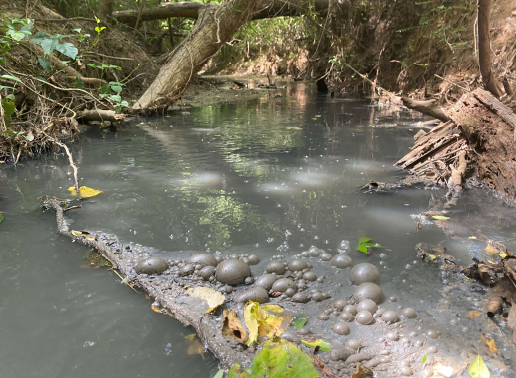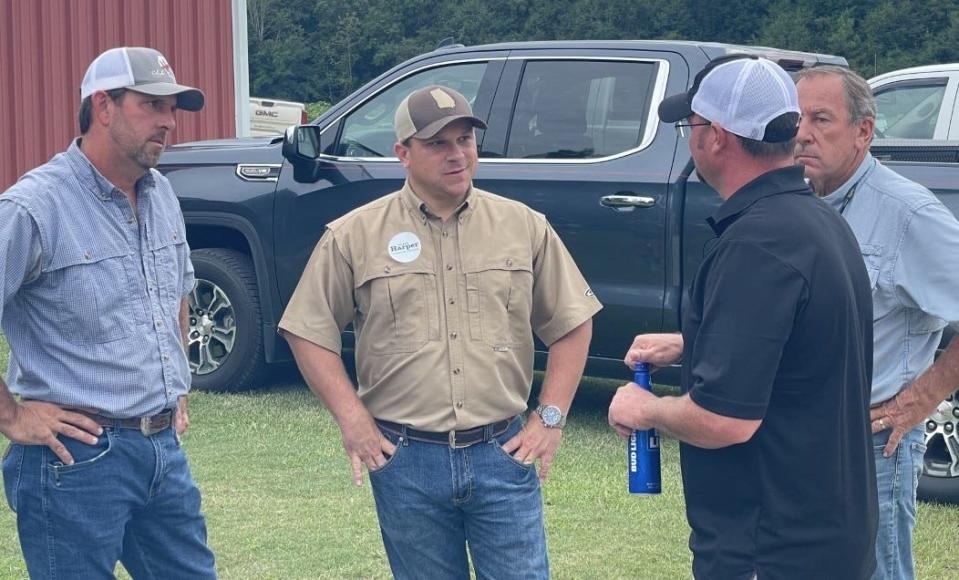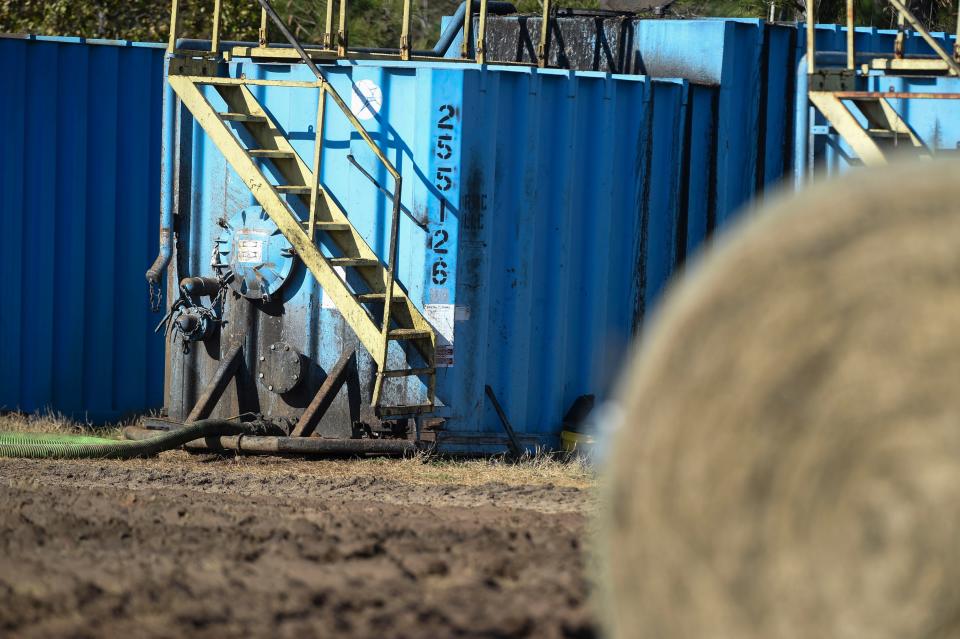Wresting control from the state: Local officials seek local oversight over soil amendments
Sam Moore, chairman of the Wilkes County commission, has been fielding calls about soil amendment for years. On a Thursday night in late June, he received a call leading him to Little River, a tributary of the Savannah River north of Augusta. There, he saw the aftermath of a soil amendment spill that left 1,700 fish dead and kicked up dust on the issue of soil amendment throughout east Georgia.
This year, Moore said he feels the county commissioners are more organized and coordinated to tackle the issue than they've ever been. Working under the Association of County Commissioners of Georgia (ACCG), he has banded together commissioners from all over east Georgia with the common goal of getting more local authority to handle a situation they feel is out of hand.
Soil amendment complaints ramping up
Some Georgia farmers turned to soil amendments as a cheap alternative to fertilizer, which is designed to introduce nutrients to the soil to promote plant growth. Though soil amendments might contain some beneficial nutrients, such as nitrogen, amendments are designed to improve soil texture, its aeration and ability to absorb water.

While complaints about soil amendments are nothing new, Moore and other commissioners agreed the complaints and demands for action have ramped up over in the last year. But despite the complaints they receive, Moore and his fellow county chairs argue their hands are tied.
"It's kind of a circle, that when citizens call us they really can't seem to ever get anywhere," Moore said. "I think the people in our county are beginning to realize this is a state issue and there's not a whole lot the county is allowed to do."
Oglethorpe County commission Chairman Jay Paul knows that struggle all too well. He's served only about two years in his current position. Before that he spent more than a decade working for the Georgia Environmental Protection Division as an environmental specialist. In that role, he said his agency received complaints of the smell and nuisances of soil amendments.
But just like now, his hands were largely tied back then.
Right now, the Georgia Department of Agriculture regulates and enforces rules regarding soil amendments. If it crosses into an environmental contamination problem — like the fish kill — EPD will step in. But for county commissioners, they have no say over what soil amendment enters or is used in the county. And they can't make landowners stop applying when flies or stench harm the quality of life for neighbors.
Paul's first encounter with soil amendments was in 2009, when he said the EPD received a complaint from Elbert County. He said EPD regularly received calls throughout his time with the agency, but the only time employees could write citations was when there was an obvious solid waste violation, such as septage on a field. Of course, he said, they couldn't penalize anybody for breaking Georgia Department of Agriculture rules.
Looking to take back control
County commissioners have a couple of ways they want to try and take back local control over the issue. Todd Higdon, the chair of Madison County’s commission, likened the powers local leaders have over other types of possible sources of pollution, such as engine oil.
“My code enforcement officer in the county can go out tomorrow if you dump a 55 (gallon) drum of oil in your backyard and run it into the creek. He’s coming with a fine; at the county level, not the state level,” Higdon said. “Why are these (soil amendment distributors) any different?”

GDA has maintained that this type of delegation isn’t possible, that it would require a change in the state constitution to legally share those powers so that local leaders could enforce laws in lieu of employees at GDA or EPD. But attorneys at the Southern Environmental Law Center say that is incorrect.
April Lipscomb, a senior attorney at the SELC and leader of the Georgia Water Coalition, a group of water advocates throughout the state, said it would require legislative action at the Capitol but there is legal precedent for what the commissioners want. For example, she said that the Georgia Erosion and Sedimentation Control Act (E&S Act) allows EPD to certify counties or cities as local issuing authorities to administer and enforce the E&S Act.
Once they’re certified, those local entities can issue land disturbance permits and enforce violations of those permits. Lipscomb said something similar could be done for soil amendments, giving the counties the power to inspect soil amendment application sites and enforce violations of the soil amendment laws.
Looking to the lawmakers
The Association of County Commissioners of Georgia, a nonprofit organization for Georgia’s county governments, is working on legislation that would allow county governing authorities the ability to inspect locations where soil amendments are being applied. Additionally, the organization said counties would like to know the chemical makeup of soil amendments and where it is being applied in their respective counties.
ACCG said it will use personal testimonies of citizens and county elected officials to “tell the story of how their rural quality of life is threatened without enhanced oversight and enforcement over the application of soil amendments.”

A proposed bipartisan bill, introduced by Rep. Rob Leverett (R- Elberton), did not make it out of committee in time to become law this session, but will be up for consideration again next year.
"It's been a big problem in my district and in some other districts around me," Leverett previously told the Network before introducing the legislation, HB 477. "I think it's an important program and I think it's a good program. I want to see the program stay and I'm just worried that some of the abuses by some bad actors will hurt the overall health of the program."
Leverett worked with ACCG on the bill, which would set up an online portal where soil amendment distributors would have to log the location and composition 48 hours before spreading, if the county opts in. It would also allow county officials to issue stop-work orders in cases of egregious violations of the soil amendment law and notify GDA for further enforcement.
Now that the bill is on hold until next session, ACCG is hoping the state Legislature will provide additional resources for GDA to inspect and enforce the application of soil amendments.

Early after the bill's failure, that wish is starting to be realized. On March 9, Georgia Commissioner of Agriculture Tyler Harper released a statement that the state House allocated $550,000 in its budget as additional funding for the Soil Amendment Program.
Beyond asserting powers at the local level, the county commissioners said state regulation could remedy the problem as well by requiring industrial facilities to process their waste on-site.
One of the main reasons facilities are assumed to prefer getting rid of their waste as a soil amendment is because it’s cheap, and it circumvents a major problem: soil amendment waste is too far from water for wastewater treatment centers, but it's too much of a liquid for landfills. By requiring companies to solve the problem at their facilities — which is costly, but can be done — Higdon said it wouldn’t foist the burden onto communities to deal with the waste when it is deposited sporadically by companies with little oversight.
The example the commissioners gave was processing chicken through stainless steel pipes. Regular steel can’t be used because it picks up unsafe bacteria, which is why processing facilities were required by state law to use stainless steel pipes for health safety. Likewise, they said, requiring companies to process waste on site would protect Georgians.
“They would probably do it,” commission Chair Lee Vaughn of Elbert County said. “They wouldn’t like it, but they’d probably do it.” It would be costly, but like the stainless steel pipes, it would be a cost of doing business that has to be done.

While the recent ire from communities over soil amendment has been larger than in the past, the complaints aren’t new.
A 2008 lawsuit alleges that more than 100 complaints were filed with the EPD against a single soil amendment company from 2007 to 2008 alone. Moreover, county commissioners, EPD’s online complaint tracker and community members themselves say that a steady stream of complaints has been consistently aired throughout the last two decades.
The commissioners previously tried and failed to have legislation at the state level remedy their problems. But this is the first year they’ve worked so collaboratively on the issue, and they agree the communities have rallied more around the issue this year than ever before.
This article originally appeared on Augusta Chronicle: Oversight of soil amendments needed at county level in Georgia

